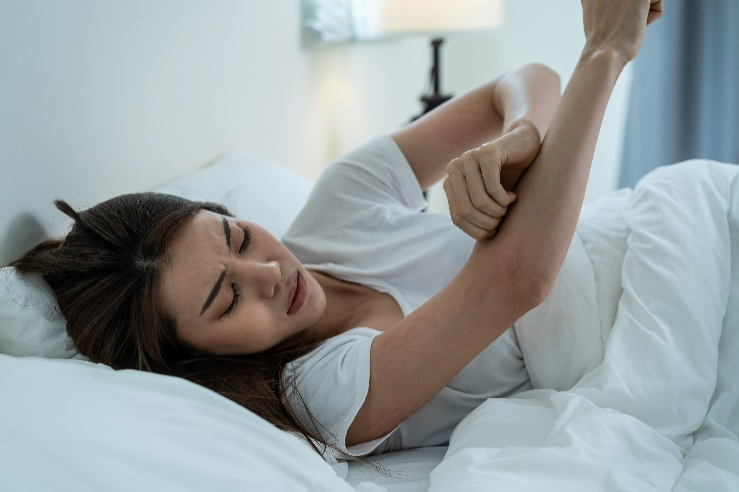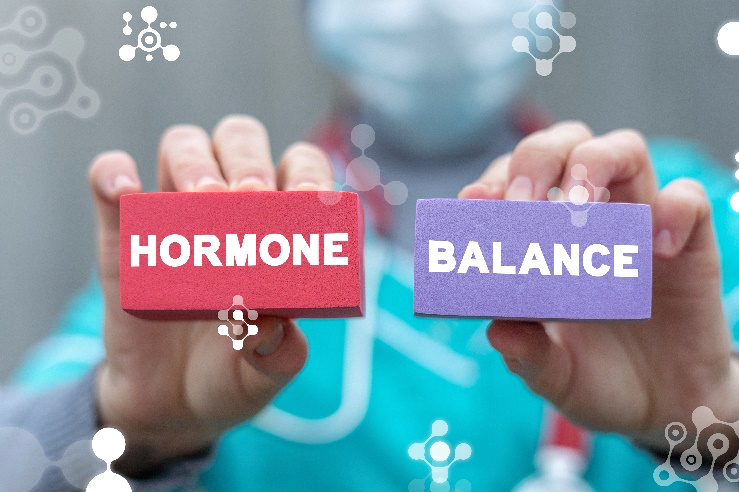
Welcome to this month’s blog. I am excited to be exploring another less talked about symptom of menopause – the impact that fluctuating hormones can have on our skin and in particular the sensation of itchy skin or as some describe, the sensation of “insects crawling over their skin”. This is one of the less talked about symptoms but one that can cause much distress to women who experience it, but like changes to our voice, is often largely ignored by health professionals and women alike. Of course, we know that anxiety, insomnia or hot flushes are some of the most common symptoms and so we naturally focus on those and overlook some of the other sensations we experience.
How is our skin affected?
We know that as we transition through menopause, our skin, hair and nails can all become drier and brittle. I was amazed when my hair started to appear frizzy and dry and no matter what I tried, nothing helped; and then at the same time I noticed my nails, which had always grown long and strong, suddenly started to flake, break, and peel. I didn’t know what was going on or what to do about it. I tried all kinds of treatments for my nails but like my hair, nothing worked. Then I noticed that my skin was getting drier. It didn’t matter how much moisturiser or hand cream I applied, my hands were always dry – my skin felt rough and looked dry. I didn’t know what was going on or what to do about it.
Luckily for me though, I didn’t suffer with some of the other symptoms associated with dry skin, namely in growing hairs, excessive itchiness or the sensation of crawling. Some of my friends started to mention that their bodies felt itchier, and they had the urge to scratch constantly. Now this got me thinking. I had been feeling itchier in places – most under my bra strap or across my back where I couldn’t reach. I’d ask my husband to constantly scratch my back for me which he did, although the number of times I called on him drove him crazy, or I’d act like a bear and rub my back on the door frame! OMG what was going on?
Plus, I noticed that my skin felt itchier or I’d have these excessive itchy moments more at night or in bed which made my insomnia even worse; or after I’d had a hot flush or a night sweat I’d have that urge to scratch. I didn’t know what was going on or how to stop it, but it was steadily driving me mad. OMG I’m actually starting to itch whilst writing this – shows the power of suggestion to my mind!
What causes the sensation of skin crawling?
This is a medical condition known as formication and is a form of tactile hallucination where you feel like insects are crawling just under the surface of your skin but there’s nothing there in reality. Many things can cause this such as poor mental health, anxiety, certain medications, medical conditions such as Parkinsons or Fibromyalgia, or hormonal fluctuations at menopause. The sensations can be varied across sufferers but are described as burning, tickling, numbness or pins and needles.
“Skin crawling” is something that isn’t directly caused by the fluctuations in our hormones at menopause, but more is a compound symptom i.e., you may be suffering other related symptoms which can increase the risk of you also experiencing formication, and many of these underlying symptoms come along with menopause:
- Aching joints and limbs,
- Feelings of fatigue or exhaustion,
- Brain fog,
- Anxiety or depression,
- Overheating, or
- Mood swings.
You will recognise many of these symptoms as part of perimenopause, which can also affect our thinking and emotions. One symptom creates another and builds on the next and formication can result.
What have hormones got to do with this?

Hormone fluctuations can impact many different parts of our body’s functions, and oestrogen plays a particular role in keeping our skin feeling good. Oestrogen helps to keep our cells, both internal and external, hydrated and plump through the production and distribution of collagen. As we go through menopause, oestrogen levels drop along with the production of collagen and other natural oils which support our cells. This can result in excessive dryness which of course leads to itching. You may also notice your skin becomes thinner, has less elasticity so is more prone to showing fine lines or wrinkles and may take longer to heal when you scratch or cut yourself. These are all normal as we age.
What have hormones got to do with this?
There are several things we can do that will help to support our skin and stop us feeling the need to scratch, or even help to stop the sensations that come with formication:
- Stay hydrated – we can do this in a few different ways. Drink more water so we are supporting our internal cells to say hydrated; apply a good moisturiser daily to our face and bodies and especially after showering, but make sure it has a high PH value; take a collagen supplement either applied direct to your skin or via a drink; try to stay out of drying environments such as extreme heat or cold, or try using a dehumidifier.
- Avoid toxins – this comes up. Reduce your consumption of caffeine and alcohol, both of which can have detrimental impacts on the way your skin ages. Give up smoking or taking other recreational substances, all of which can make your skin age less well.
- Change your dress – avoiding manmade or heavy fabrics can have a positive impact on your skin as it cuts down the chances of overheating which can cause itchiness. Try natural fibres and dress in lighter layers that allow your skin to “breathe”.
- Avoid spending too long in water – we all like a long soak in a hot bath or spending time relaxing in a hot tub, but both can cause your skin to dry and itch. Have you ever noticed how hot water can make your skin itch on first touch?
- Try to relax – stress is so bad for you mind and body and is implicated in anxiety, depression, fatigue, loss of sleep and many other menopausal symptoms. These symptoms can be compounded, resulting in great risk of developing formication. Take up yoga, meditation, or mindfulness to help to reduce your stress.
- Stop scratching – easier said than done, I’m sure! Try tapping or patting your skin instead or try dry brushing daily before showering and getting dressed. This will stimulate your blood vessels and remove old dead cells which can add to itchiness.
- Take HRT – as many of these symptoms can be related to the fluctuations in oestrogen through menopause, talk to your GP about the possibility of taking HRT which studies have shown can increase the levels of skin hydration and surface lipids, as well as increasing the amount of collagen.
For more support and information
If you are experiencing perimenopausal symptoms or think you may be then please reach out to me at jeanette@phoenixwellness.co.uk and we can explore how our programmes might support you better. You may want to take a look at some of our other blogs exploring some of the more common symptoms of menopause and how to manage those at www.phoenixwellness.co.uk Alternatively we have many webinars available via our monthly membership Phoenix Wellbeing Café that can support your wellbeing in the broadest sense.

